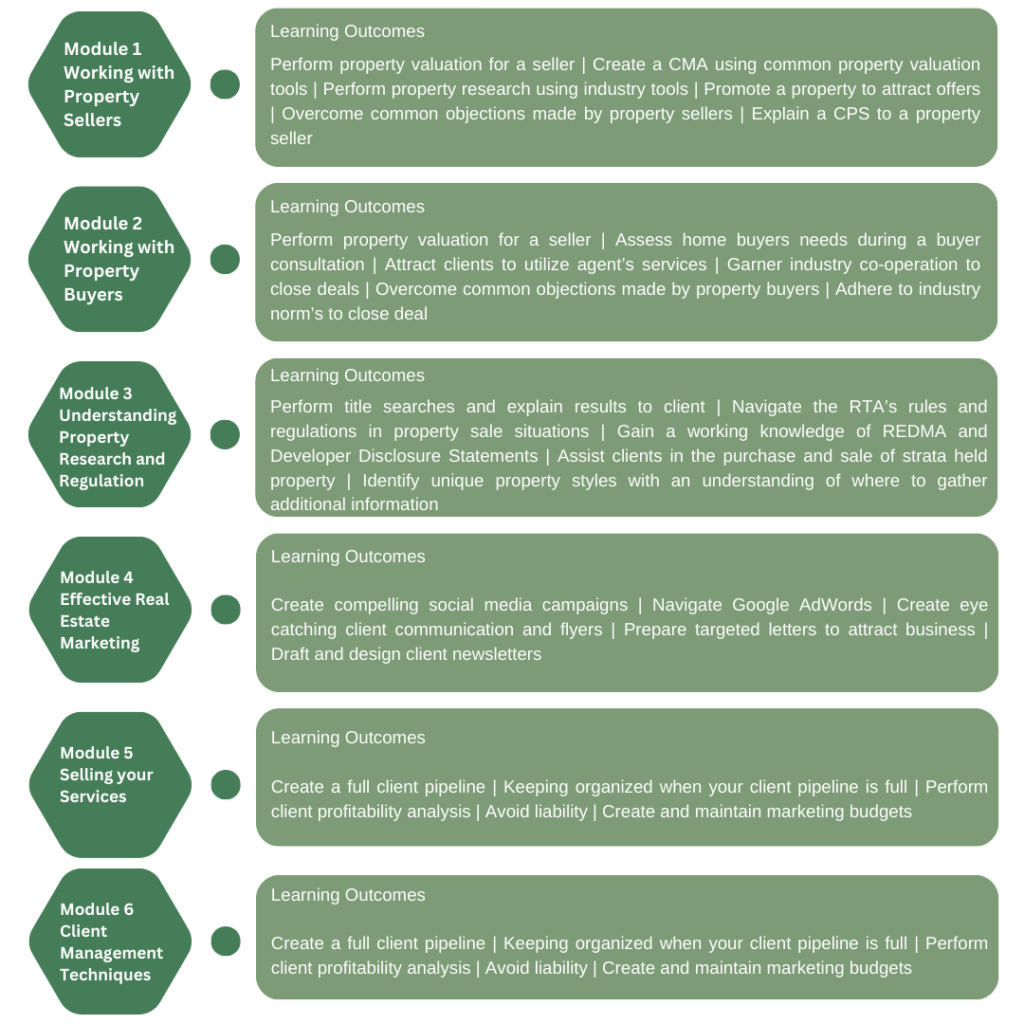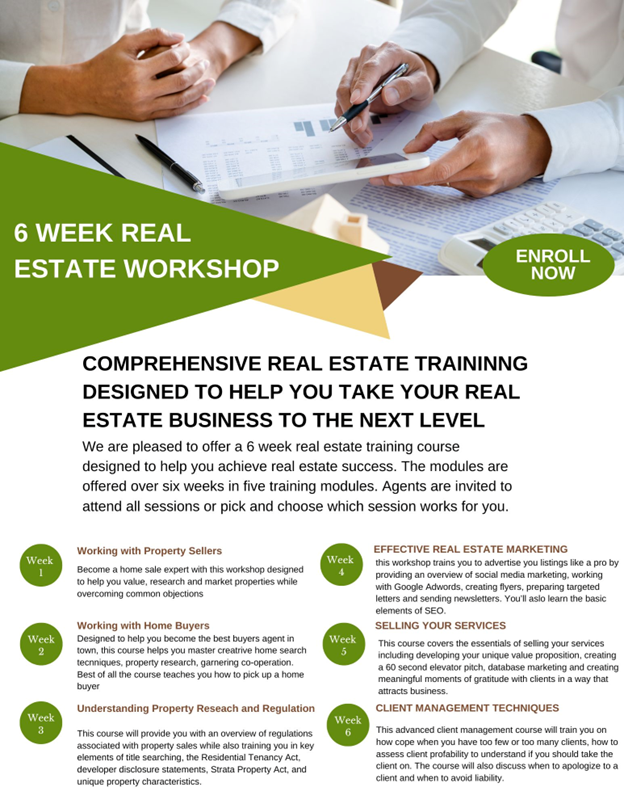
Hypothetical Real Estate Class
I recently completed a curriculum development class through VCC, which is one of the three classes required for a Train the Trainer Certificate. I’m taking these classes during my semester breaks from Carleton’s MBA program.
The class required me to design a course outline, learning objectives, and a lesson plan. As an incurable real estate nerd, I chose to create a 30-hour course designed to provide practical skills to new and emerging real estate licensees.

In the practice of real estate, agents are required to evaluate homeowners’ residences, conduct accurate property valuations, and develop effective marketing campaigns—all while forging personal connections with clients. This comprehensive process must be efficiently executed within 60-75 minutes, often in a competitive environment and while managing client objections. Furthermore, agents are required to articulate their unique value proposition to potential clients spontaneously.
Much of the work in real estate operates within nuanced, ambiguous contexts, demanding a blend of industry experience, practical knowledge, and adept decision-making abilities to navigate transactions successfully. Both agents and brokerages have expressed a specific need for training that enables realtors to operate confidently and professionally in ambiguous scenarios. The objective of this training is to arm students with a comprehensive toolkit of competencies, including essential decision-making skills and technical sales skills.

The need for this training is supported by a combination of consultations with real estate brokerages, industry experience, and a review of the BCFSA’s post-licensing education program. The course will offer training in working effectively with home buyers and sellers, including specialized instruction in objection management, property valuation techniques, and document preparation essentials. Additionally, the course will equip agents with technical expertise related to unique property types, ensuring they can confidently navigate diverse real estate scenarios. Special emphasis will be placed on developing problem-solving skills to empower agents in handling unusual situations that may arise during transactions.

The course will cover the following subjects:
- Strategies for effective objection management during negotiations
- Methods for accurate property valuation considering market trends and property specifics
- Essential skills in document preparation, ensuring compliance and efficiency
- Technical knowledge related to unique and unconventional property types
- Problem-solving techniques tailored to address unexpected challenges in real estate transactions

In this business development course, formal exams will not be utilized. Instead, practical real-world business development projects will serve as the primary assessments at the end of each session. Depending on the lesson’s subject matter, student work will either be evaluated in the subsequent session or through group assignments where peer feedback is incorporated.
For instance, one session will concentrate on crafting a concise 60-second elevator pitch. Students will be grouped together to practice and provide constructive feedback to one another. Another session will focus on preparing property valuations and presentations. During this session, students may schedule individual appointments with the instructor to review their presentations and receive personalized feedback.
To ensure the learning and teaching strategies in this course align with these goals and objectives, as well as with the proposed assessments, I have designed the course around practical, real-world tasks that mirror industry challenges. These tasks will not only assess agents on their ability to perform under time constraints and competitive pressures but will also evaluate their proficiency in personal client interactions and their capability to demonstrate their value proposition effectively.

Students have multiple opportunities to provide feedback during the lesson. Before the class begins, I reach out to students via email to inquire about specific areas of interest they would like covered. During the class, I actively ask questions and encourage students to share suggestions for improvement and additional content. This interactive approach allows students to contribute their ideas and preferences during the lesson. Additionally, at the end of each course module, students are given a survey to provide comprehensive feedback about the course, ensuring that their voices are heard and valued throughout the learning experience.

This 30-hour course is broken into six classes with approximately 5 hours of instruction each.

Lesson Plan for Day 1

|
L E S S O N
/ W O R K S H O P P L A N
T E M P L A T E Note: Expand each section
of this template as required Lesson/workshop number (from Course
Schedule): Day 1, 9 am – 10:40 am. |
Total time for lesson: 100 minutes |
||
|
Lesson / Workshop
Objective(s); include DACUM / Profile chart number, if appropriate / Topic(s)
from Outcome Guide, if appropriate: Workshop A, Lesson 1
Performing Property Sale Valuation |
|||
|
L
E S S O N / W O R K S H O P E L E M E N T S |
|||
|
Instructor / Facilitator Activities |
Learner / Participant Activities |
Resources |
Time |
|
Opening / Gain Attention /
Bridge-in / Motivation Strategies… Introduction
to class. Discuss
objectives to be learnt in the day. Overview
of the schedule and technology to be used. Introduce
myself as the inductor and detail my background and qualifications to teach
the class. |
Invite learner to introduce
themselves and their background. Participate
in discussion |
Projector, computer and
clickers. |
15 Minutes |
|
Pre-assessment… A
complex property valuation will be shown. Learners
will be asked how many property valuations they have performed and what types
of properties they are comfortable valuating |
Answer student questions |
Projector, computer, and
clicker |
10 minutes |
|
Presentation / Practice /
Formative Evaluation… Detail
the three types of property valuation, comparative, cost-base and income
approach. Ask
students which types of property valuation tools they have used. Explain
the principles of a cost-based property valuation. Perform
a simple cost-based property valuation. Introduce
tools used to find constructions costs including Altus Construction Cost
guides and new home sale prices. Review
student same valuations and discuss results. Explain
the principles of an income-based property valuation. Perform
an income based approached valuation. Solicit
students to provide a property address to use for the valuation. Explain
the principles of a comparative based property valuation Perform
a comparative based approached valuation. Solicit
students to provide a property address to use for the valuation.
|
Listen
– Respond to questions. Assign
a property address, pair students into groups, ask them to perform the
valuation on their own using the tools provided. Listen
– respond to questions. Solicit
students to provide a property address to use for the valuation. Listen
– respond to questions. Assign
a property address, pair students into groups, ask them to perform the
valuation on their own using the tools provided. Listen,
respond to questions. |
Projector Projector,
teacher computer, student computer. Projector,
teacher computer. Projector,
teacher computer. |
15
Minutes 20
minutes 10
minutes 20 minutes |



Looking to create your investment strategy? I can help with that.
Get in touch today and let me help you find just the right place. Click on the link or me at 604-376-3350 to get the process started.
If you are looking to buy or sell, I can help. Get in touch today!
Looking for a one-of-a-kind place to call home?
Want reasonable terms on your purchase agreement?
Want expert guidance on the home purchase process?

ABOUT LIZ PENNER YOUR BEST LANGLEY REAL ESTATE AGENT
Liz Penner is a top-selling licensed real estate salesperson with the Fraser
Valley Real Estate Board and has been a top-selling realtor specializing in the residential resale of condos, townhomes, and houses for over a decade. Liz assists residents of the Langley and Surrey areas to sell real estate while looking out for the client’s best interests. Liz also helps first-time homebuyers, families, and repeat purchasers with their property search process, ensuring that her clients get access to the very best homes on the market while receiving excellent service ensuring that they find the perfect place to call home.
Liz holds a BBA in leadership and has completed a variety of specific training through the Fraser Valley Real Estate Board in the areas of selling strata properties, foreclosures, estate sales, and new construction properties. Liz is also well versed in POAs, the Strata Property Act, and more. If you are looking for a knowledgeable and professional real estate agent that is willing to do everything possible to ensure that you get top dollar for the sale of your home or to find the dream home you are looking for in the Surrey and Langley, BC areas then get in contact today.
If you are looking for a knowledgeable and professional real estate agent that is willing to do everything possible to ensure that you get top dollar for the sale of your home or to find the dream home you are looking for in the Surrey and Langley, BC areas then get in contact today.
WHY LIST YOUR HOME FOR SALE WITH LIZ PENNER
-
- I’ve helped sell over 400 properties throughout the Langley and Cloverdale area, and I’d love the opportunity to do the same for you.
-
- I’ve experienced straightforward sales and sales that have gone off the rails, back on the rails, off the rails, and then back on again. That’s just the way the real estate train rolls, and it never rattles me.
-
- I’ve got a solid toolkit to pull from when a problem arises. I take my job seriously each time, and I will make sure you get top dollar for your Fraser Valley, Langley, or Cloverdale home, smooth sailing, or otherwise.

